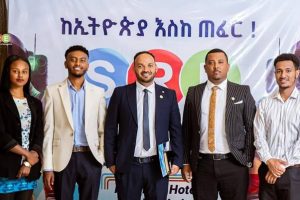BY HAFTU GEBREZGABIHER
The devices that examines soil and developed by Jimma University internationally recognized becoming the first finalist. The device, which was developed by teachers and students from the University, along with other companies in the course of the process, won a $25 thousand prize in Uganda, Kampala.
This soil testing tool, named ‘Omishtu-Joy’, which was recognized on the international stage, was designed by teachers and students at Jimma University a few years ago.
A World Bank program, the Global Index Insurance Facility (GIIF), announced the top three winners of the Africa AgTech and Inclusive Insurance Challenge in March of 2022.
The project is a Debo Engineering and Melkam Technology joint venture tech startup, Omishtu-Joy took home the top prize of US$ 25,000. It is a business focusing on increasing crop productivity by measuring soil PH, NPK, moisture, humidity, and temperature level, supported by an AI system that matches crops to farmlands.
Farmers Review Africa published that Omishtu-Joy currently works with over 5,000 farmers who use their device, and is now training an additional 4,300 farmers, with a target to onboard 18,000 more by the end of 2022.
The second and third place winners are Rural Farmers Hub from Nigeria and Agrotech+ from Kenya, who took a financial reward of US$ 15,000 and US$ 10,000, respectively.
The small amount of equipment analyzes the elements in the soil and identifies which plant is planted in that soil or which seed is sown as the best possible outcome.
Omishtu Joy which is funded by the World Bank has been competed in the ‘Africa Start Up Joe’ competition with works from 23 nations and won the award for finishing first.
The device also identifies soil nutrient content, temperature and moisture and sends the results to smartphones.
In 2021, the concept comes from the students to fulfill the requirement for the graduate. It was then supported by teachers and reached this level, Jarmia Bayisa, a computer science lecturer at the university, told the BBC.
Before sowing seed in one area, the ability to identify as if the soil is suitable for which type of seed leads to increased production, it was learnt.
In Ethiopia, where the agriculture sector is still considered as the backbone of economics, there are few soil testing centers. Devices for soil testing measures are also expensive and not accessible.
To address this problem, the developers of this project said that the small-scale soil testing tool has come up with a solution.
Jarmia stated that ‘Omishtu-Joy’, explores the soil after taking a soil sample and explains that in a short period of time, it identifies the acid, substances and moisture in the soil and sends the results to a cell phone.
Not only did the device use the advanced artificial intelligence technology (ART), but it also used its size as simple as people could easily move it around, Jarmia explains.
To make it easier for people who cannot read and write to use the device, Omishtu’s order is being used to ensure it can be able to deliver the investigation results in the form of voice, Jarmia added.
“If a farmer has a smartphone, we are working to order it with the voice and make it feel the results,” he said.
“In addition to English, we are working in five languages in Oromiffa, Amharic, Somali and Tigrigna. We intend to add two languages among the languages spoken in the Southern Regional State, “he added.
While we are striving to increase agricultural productivity and mass production of Omishtu-joy to farmers, the limitation in the importation of equipment such as commuters and other inputs that help produce the device is a hindrance, it states.
“Inputs used to manufacture the equipment are easily available in foreign countries. However, shortage of foreign currency has become difficult to import these goods, “he explains.
“The role of technology and innovation will be critical to driving growth in underpenetrated financial and insurance sectors across Africa, where a young and growing pool of tech talent and a dramatic increase in digital connectivity will directly boost Africa’s economic value,” said James Smouse, Global Head of Insurance in IFC’s Financial Institutions Group. “We are very excited to support Africa’s young entrepreneurs through the Africa AgTech & Inclusive Insurance Challenge,
Fatou Assah, GIIF Program Manager for her part added that this was a great opportunity for start-ups in this space to collaborate with IFC and its partners and bring to the fore game-changing ideas that will contribute to the transformation of Africa’s agricultural sector”.
Powered by Sankalp Forum, the Africa AgTech & Inclusive Insurance Challenge aimed to celebrate and support young entrepreneurs who are working at the intersection of agriculture, insurance, climate, and gender to build resilience for rural populations.
The Africa AgTech & Inclusive Insurance Challenge offered an opportunity to the most promising enterprises to win various awards for a total of $50,000 USD across three categories (Data & Analytics, Agricultural Productivity, and Financial Inclusion for Ag). Through participating in the Sankalp Africa Summit 2022, the top innovators are expected to gain exposure on investment readiness, network with potential impact investors and improve their business models. Collectively, this will make their innovations more competitive in future funding rounds.
The Ethiopian Herald June 10/2022





